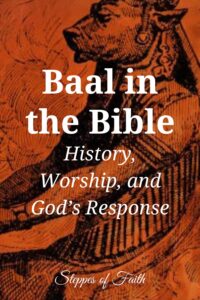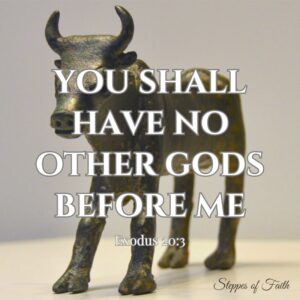
“You shall have no other gods before Me.” (Ex 20:3)
A recurring theme throughout the Old Testament is Israel’s idolatrous rebellion against God. One of the more popular idols throughout the eastern Mediterranean area was a Canaanite and Phoenician male god called Baal. The Phoenicians regarded him as the “Lord of the Heavens.”
Baal itself is a generic name meaning “lord,” “master,” and, in Hebrew, “husband.” People applied the name to many localized gods in the ancient world, such as Baal-peor (worshiped by the Israelites, Num 25;3), Baal-ath-beer (Josh 19:8), Baal-perazim (2 Sam 5:20; 1 Chr 14:11; Is 28:21, Baal-zebub (2 Kin 1:1-18; Mt 12:27), and numerous others (1 Kin18:19). Collectively, they are called Baalim. God (Yahweh) would still have been the national god, but the people often had a variety of deities to act in different capacities rather than having one general deity. Historically, they did not replace God but brought them alongside Him, much to His consternation.
In mythology, Baal was the son of El, the chief god (not to be confused with the Hebrew God, Elohim), and Asherah, the goddess of the sea, who was also widely worshiped. Baal’s sisters were two other highly worshiped goddesses—Ashtoreth, a goddess of fertility and the stars, and Anath, a goddess of love and war. He became the dominant god by defeating all the other gods, including his father.
[READ MORE: Separating Fact from Myth: Asherah and Idol Worship]
People worshiped Baal as the god of several different things. The Canaanites regarded him as the storm god who provided rain for the land to be fertile, which is why they usually depicted him holding a lightning bolt. He was also a general god of fertility who provided children. To appease him, the people commonly exercised child sacrifice, most often the firstborn of the worshipper (Jer 19:5). Bible teacher Bethany Verrett explains Baal this way:
“’ Voluntary offering on the part of the parents was essential to the success of the sacrifice (Rawlison 347).’ According to records, the logic was that children were both pure and innocent, as well as the most important things to a parent, and, therefore, the sacrifice was more meaningful. Sacrifice by fire was common.”
In addition to rain and children, Baal was also the cause of ritualistic prostitution in the temples and people cutting themselves violently in worship.
“So they cried aloud and cut themselves, as was their custom, with knives and lances until the blood gushed out on them.” (1 Kin 18:28)
God’s Warnings and Punishments
Very soon after God delivered the Israelites from Pharaoh, He warned the people not to worship idols.
“I am the LORD your God, who brought you out of the land of Egypt, out of the house of bondage. You shall have no other gods before Me.” (Ex 20:2-3)
Despite the stern warning, the people rebelled and engaged in unmarried sexual relations with Moabite women (descendants of Lot), who quickly corrupted the men.
“They invited the people to the sacrifices of their gods, and the people ate and bowed down to their gods. So Israel was joined to Baal of Peor, and the anger of the LORD was aroused against Israel.” (Num 25:2-3).
God’s anger was so severe that He sent a plague on the Israelites that killed 24,000 people (v9). This event followed their first rebellion when they created a golden calf to worship. God sent a plague for their sin then as well, killing 23,000 people (Ex 32:1-14, 28).
Nevertheless, the people continually went back to Baal and other gods, which is why God sent a pre-incarnate Jesus (“Angel of the LORD”) to talk to a certain young man about stopping them.
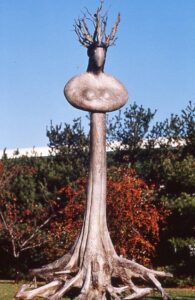
Asherah Pole
Fighting Baal Worship
Judges 6 recounts God calling Gideon into service to destroy Baal. Verses 25-26 detail the Lord’s instructions.
“Take your father’s young bull, the second bull of seven years old, and tear down the altar of Baal that your father has and cut down the wooden image that is beside it. Build an altar to the LORD your God on top of this rock in the proper arrangement and take a second bull and offer a burnt sacrifice with the wood of the image which you shall cut down.”
Some Bible translations say, “wooden image”; others indicate it is a pole dedicated to Baal’s sister, Asherah. God instructed Gideon to take down this pole, destroy the altar to Baal, and use the wood to create an altar to Him. Gideon obeyed but, in fear, did it at night to evade his neighbors (v27). However, they soon figured out that he was the one who destroyed the altar and demanded that his father, Joash, hand him over to be killed. But Joash refused and gave Gideon the nickname of Jerubbaal instead, which means “wrestler of Baal.”
The Book of Judges goes on to detail how Gideon continued to obey God and destroy the Baal-worshipping Midianites, who were severely oppressing the Israelites (Judg 7-8). Soon after, Gideon requested that the conquered Midianites give him an earring to create an ephod (more likely, a breastplate) to commemorate their victory and symbolize civil power. Unfortunately, it became a symbol of worship instead.
“Then Gideon made into an ephod and set it up in his city, Ophrah. And all Israel played the harlot with it there. It became a snare to Gideon and to his house.” (Judg 8:27)
The people’s worship marked a sad ending to Gideon’s efforts to remain obedient to the Lord and his influence over the people. Nevertheless, his intentions were not evil toward God, so He granted Israel peace for the rest of Gideon’s days (8:28). But immediately after his death, the people returned to Baal worship and forgot all that Gideon had taught (8:35).
The Most Wicked Baal Worshipers
King Ahab of the northern kingdom of Israel was perhaps the most ardent worshipper of Baal. He “did evil in the sight of the LORD, more than all who were before him (1 Kin 16:30).”
After Ahab came to power, he married a similarly evil Phoenician woman named Jezebel, whose father was a Baal priest. Ahab was already corrupt, but Jezebel turned his attention to Baal, and “he went and served Baal and worshiped him (v31).” Ahab essentially made Baal worship official after it had already been culturally and religiously popular.
Nevertheless, Ahab and Jezebel attempted to replace God. In an Antichrist-like fashion, Ahab mimicked King David (who captured Jerusalem) and King Solomon (who built a temple for God there) by choosing Samaria, which his father established (v24), and building a temple for Baal (v32). Having had enough, God sent the prophet Elijah to destroy Baal once and for all.
Recall that Baal was the god of storms, rain, and dew. It is no coincidence, then, that Elijah bravely went to Ahab and told him, “There shall not be dew nor rain these years except at my word (1 Kin 17:1).” Though his announcement enraged Jezebel, he proclaimed that the God of Israel is real and alive, unlike Baal, and he will prove it.
Soon, a profound drought came over the land. Elijah had restricted one of Baal’s supposed great powers through God’s sovereignty.
But God was not done.
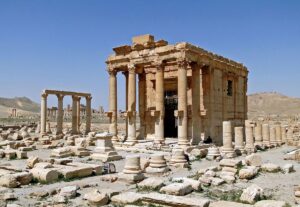
Temple of Baal-shamin in Ancient Samaria
Signs of God’s Power
Elijah hid from Jezebel for a short time (v2-7), but soon, God called him to Zarephath, a hub of Baal worship 80 miles away. There, he met a widow busy preparing her and her son’s last meal. In the middle of her gathering sticks, Elijah asked her for a cup of water and some bread. In typical Middle Eastern-style hospitality, she greeted Elijan in the name of his God and agreed to bring him water but no bread because she had only a little flour and oil left to make one last meal for her and her son. Elijah then tested her faith.
“Do not fear; go and do as you have said, but make me a small cake from it first and bring it to me. And afterward, make some for yourself and your son. For thus says the LORD God of Israel: ‘The bin of flour shall not be used up, nor shall the jar of oil run dry until the day the LORD sends rain on the earth.’” (1 Kin 17:13-14)
God controls the rain and the land. Here in the middle of Baal country, Elijah proclaims God’s power of fertility and provision by supernaturally ensuring that the widow will not run out of flour (grown from wheat) or oil (grown from olives).
But God still was not done.
Elijah’s Challenge
After some time, the widow’s son fell ill and died. The widow quickly assumed that Elijah arrived solely to judge her for her sins, a common religious assumption (see John 9:13-34). Elijah laid the boy on his bed, then he laid on top of the boy three separate times, a ceremoniously unclean thing to do. Then Elijah cried out to God for mercy, and God gave the boy’s life back to him, causing the widow to believe that the God of Israel is the one true God (1 Kin 17:17-24).
Elijah had now proven that God is sovereign over rain, food, and life itself. But God had one more task for him. He sent Elijah back to Ahab, who was seeking to kill all the prophets, to set up a challenge, a final showdown, between Baal and God.
“Now, therefore, send and gather all Israel to me on Mount Carmel, the 450 prophets of Baal and the 400 prophets of Asherah, who eat at Jezebel’s table.” (1 Kin 18:19)
Ahab granted Elijah’s request. After everyone gathered, Elijah challenged the Baal’s 450 prophets to a duel involving sacrificing a bull and placing its meat on a stack of wood but not lighting a fire. Whosever deity lighted the fire was the true God (v23-24).
Elijah allowed the Baal prophets to go first. “From morning till noon,” they cried, “O Baal, hear us!” No one answered, so they began dancing. By noon, nothing had happened, so Elijah began to mock them, accusing Baal of sleeping, being too busy, or perhaps traveling. Elijah’s words incited the prophets to cry out and violently cut themselves as per the custom (v26-28).
As the time for the evening sacrifice neared (about 2:30 p.m.), Baal still had not acted, so Elijah took his turn.
Defeating Baal, Exposing Truth
First Kings 18:30-40 recounts that Elijah took twelve stones, symbolizing the twelve tribes of Israel, and built an altar. He dug a three-foot trench around the altar and placed wood and the bull on top. He then had his servants fill four large barrels with water (remember, there is a drought) and pour the water on top of the wood not once but three times. If we do the math, four barrels of water filled three times equals twelve barrels, a biblical number of completion that also equals the twelve stones.
By the time of the evening sacrifice, Elijah called on God to show Himself.
“LORD God of Abraham, Isaac, and Israel, let it be known this day that You are God in Israel, and I am Your servant, and that I have done all these things at Your word. Hear me, O LORD, hear me, that this people may know that You are the LORD God, and that You have turned their hearts back to You again.” (1 Kin 18:36-37)
Fire immediately fell from the sky and devoured the altar—the sacrificed bull, wood, stones, and even the water in the trench. The people immediately fell on their faces and cried, “The LORD, He is God! The LORD, He is God!” Though the people repented, Mosaic Law did not allow false prophets to live (Deut 13:13-18; 17:2-7), so Elijah had them all executed (v40). In fulfilling God’s law, he also achieved retribution for Jezebel killing all the Lord’s prophets (v4, 13).
With the dismantling of Baal and justice fairly administered, Elijah returned to Ahab and told him to prepare for the end of the drought. God was about to send the rain and dew again (v41-45)—without Baal’s help.
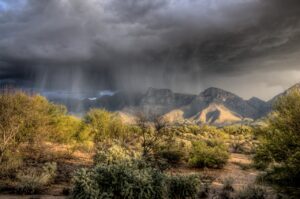
Baal Still At-Large
Unfortunately, worship of Baal returned under future corrupt kings. A few tried to bring the people back to the Lord but were unsuccessful since they did not destroy the “high places” where idol worship was prevalent. It was not until the Assyrians conquered Israel that things began to change.
Hezekiah began to reign in Judah, the southern kingdom. He destroyed all the high places, Asherah poles, and pagan images. He later found himself in a bit of trouble with the Assyrian king, but God protected him and Jerusalem and extended Hezekiah’s life when he was near death.
Judah enjoyed twenty-nine years of peace. But upon Hezekiah’s death, his son, Manasseh, rebuilt the high places, set up an Asherah pole in the Lord’s temple, and sacrificed innocent people to Baal, including Isaiah, the great prophet. As a result, the people once again abandoned God and returned to Baal.
Soon, however, God’s patience wore out. He allowed King Nebuchadnezzar of Babylon to capture Israel and Judah for seventy years, during which time, the people yearned again for the Lord as they had in Egypt. Eventually, God allowed them to return to Jerusalem and rebuild His temple.
Worship of Baal-like idols still exists in certain remote parts of the world, including Central America. But the Bible clearly shows that such worship is dangerous and evil since they are worshipping Satan and his demons (Mt 12:27; 1 Cor 10:20). Those who do not worship the one true God risk great judgment at His hand when they finally stand before Him on the Day of the Lord (Rev 20:11-15).
